Speaker
Description
In times of accelerating climate change, there is an urgent need for a predictive theory of species’ range shifts, adaptation, and species’ resilience under changing environments. Current predictions are limited, as they rely on theory that neglects important interactions between ecological and evolutionary forces. I will demonstrate that the feedback between selection, genetic drift, and population dynamics fundamentally changes these predictions. This eco-evolutionary feedback creates a tipping point where genetic drift overwhelms selection, and species’ range contracts from the margins or fragments abruptly – even under gradual environmental change. This tipping point is determined by three parameters: two quantifying the effects of spatial and temporal variability on fitness, and one capturing the impact of genetic drift. Importantly, I show that by increasing the ”neighbourhood size” (the population accessible via dispersal), dispersal can counteract the loss of genetic variation, which would otherwise limit evolvability and increase extinction risk. This suggests that increasing local dispersal, possibly via assisted migration, can facilitate evolutionary rescue when local population size is small. While standard ecological niche models assume that species’ ranges shift with environmental change, this study shows that eco-evolutionary feedback can lead to a sudden range fragmentation into disjunct subpopulations with depleted genetic variance, increasing the probability of extinction.

